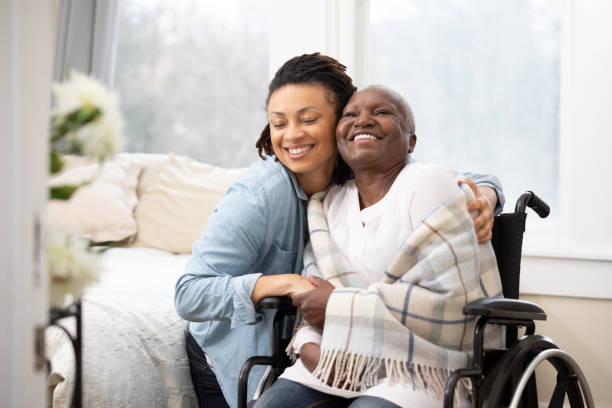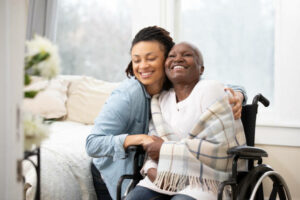
Eight Myths and Truths About Family Caregivers
Indeed, you have heard this quote:
“There are only four kinds of people in the world. Those who have been caregivers. Those who are currently caregivers. Those who will be caregivers, and those who will need a caregiver.”—Rosalyn Carter
How true.
Jenny, who nursed her 29-year-old husband for 18 months before he died of a brain tumor, said:
“At times I wished I could escape from the situation. But he needed me more than ever. At times I felt very alone.”
Loneliness, sadness, fear, grief, anger, guilt, and worry are some emotions that often bubble up when caring for an ill loved one.
One cannot overstate the challenge of caregiving.
However, some common beliefs about family caregivers don’t add up.
Though difficult, caregiving is not all gloom and doom.
This article will help dispel eight erroneous beliefs about family caregiving and share a few basic facts.
But first—
What Is a Family Caregiver?
According to the Family Caregiver Alliance (FAC), a caregiver is an “unpaid individual (for example, a spouse, a partner or others) that helps with personal activities of daily living (ADLs), such as eating, bathing, toileting, dressing, and medical tasks.”
The National Alliance for Caregiving (NAC) and AARP present updated caregiving statistics in the U.S. every five years.
Caregiving in the U.S. 2020:
- 53 million Americans are providing unpaid care for relatives and friends, or nearly one in five (19%) are providing unpaid care to an adult with health or functional needs.
- 24% are caring for more than one person.
- 26% have difficulty coordinating care.
- 26% are caring for someone with Alzheimer’s disease or dementia.
- 21% of family caregivers report their health is fair to the poor.
- 23% of Americans say caregiving has made their health worse.
Who are today’s family caregivers?
- 39% men
- 61% women
- 34% Boomer
- 23% Millennials
- 29% Gen-X
- 7% Silent
- 6% Gen-Z
As you can see from the statistics, family caregivers are diverse.
Though varied, myths about caregivers abound.
This article will shed light on eight widely held false beliefs about family caregivers and their role in caring for loved ones, versus the truth.
Eight Myths and Truths About Family Caregivers
MYTH #1:
Most family caregivers are middle-aged women.
FACT:
Ages 40-60 are considered “middle-aged.” As noted in the statistics above, 61% are women, but how many of the “women” are millennials (ages 25-40 years)? Thousands of female millennials care for loved ones.
One study showed that more than 20% of family caregivers are millennials.
Meet 30-year-old Emily. She writes:
“I’m beyond furious right now! Both Mom and Grammy are irresponsible with money. They let the power bill slip a couple of months without my knowledge. Mom made a small payment in December, barely enough to leave a dent in the account.
“Mom had a doctor’s appointment today three hours away, and Grammy was nice enough to take her so I could sleep in. I woke up and discovered the power had turned off! The house’s temperature was already down to fifty-seven and continued to drop. We had an electric stove so I couldn’t cook.
“All but three dollars of my check went to rent this month because Mom couldn’t give her portion of it in time. There’s no other income for at least two more days.
“I’m hungry. I want to shower but I’d rather not have icicles hanging off my nips!”
Yes, Emily, a millennial trying to care for her mother and grandmother, was angry.
MYTH #2:
The government—that is, Medicare—will handle most of the costs for elderly care.
FACT:
Medicare pays for long-term care in a facility only for a short while. After that, Medicaid kicks in to help low-income families if they qualify. Generally, costs related to care for these loved ones will fall on their family members, and often one member shoulders most of it.
Services included home healthcare aides, assisted living facilities, and nursing homes.
Meet Susie, a fed-up sibling. She writes:
“My mum moved into residential care two weeks ago and loves it. Why? Because she has company is well cared for. I fully supported her decision.
“But my brothers? Oh no! One stopped talking to me. The other doesn’t understand why I haven’t found a job yet and moved out of the family home.
“My brothers want me to pay for my mum’s residential care.
“Times like these are when I’m convinced that I’m adopted.
“I’m so angry! I have had to put my dreams on hold constantly!”
Whoa!
Susie and her brothers need to communicate instead of having feelings of bitterness, anger, and resentment toward each other.
Nonetheless, the family will be responsible for their mother’s residential care—not Medicare.
MYTH #3.
If you have a big family, you can depend on everyone pitching in to help out.
FACT:
Not true. Often, just the opposite happens—family and friends will scatter. Perhaps a few will stick around to help, but most will disappear. Indeed, this can be heartbreaking.
Meet Jane, the oldest of five children and the only girl.
Jane complained:
“Can’t we all just get along?!” yelled Jane to her four brothers.”
The sibling’s eighty-three-old ailing mother was having memory issues. The problem was providing the best care for their mother.
Would their mom continue to live with Jane, presently the primary caregiver?
But why should the female in the family always take the brunt of caregiving?
Perhaps their mother could live with Jonathan, the second oldest sibling, and his wife?
Should Jane be the only sibling responsible for taking their mom to the emergency room at 2:00 a.m.? Was this fair?
And around and around it went as the siblings had heated discussions regarding their mother.
Family feuds can lead to significant conflicts!
The family hoped to preserve family relations peacefully.
The above example is but one that illustrates the Myth that the whole family is always pulling together to care for an ill loved one.
Family cooperation isn’t always a given.
MYTH #4:
For the most part, “caregiving” means feeding your loved one, administering medications, and changing beds.
FACT:
Caregiving is hard work and requires a lot more than that!
Caregiving means 24/7 supervision that could include wound care, injections, operating medical equipment, getting the patient to the toilet, and emptying urine bags (or, if incontinent, changing them frequently).
The full-time caregiver often handles the finances as well.
Meet Mary—she’s frustrated!
“My husband was late for a doctor’s appointment this morning. According to him, I didn’t wake him up early enough.
“He had two hours to get ready, but he went to the wrong location because he didn’t listen to the nurse’s directions!
“It doesn’t matter that I’ve scheduled appointments, ordered med refills, filled his med tray for the week, kept records of his weight daily, cared for the house and the animals, paid the bills, and all the other stuff!”
Yes, Mary felt defeated.
MYTH #5:
Caregivers are experts and don’t need help.
FACT:
Expertise is one of the greatest myths!
Caregivers are exhausted, overwhelmed, and emotionally spent.
And it is common for caregivers to take their health for granted.
So, caregivers get sick and discouraged quickly and even depressed.
Meet Doug, tired and depressed:
“I do not complain. I am a caregiver to my wife, Ann, age seventy-three, and my dad, Walter, age ninety-four, and I consider it an honor and privilege to serve them both.
“My wife had had a collapsed lung and had suffered a heart attack, and I almost lost her.
“My dad had had a stroke. He was almost paralyzed on one side of his body. His hearing had faded, but he was a fighter and still hanging on.
“Of course, they both need help wiping. However, I feel fortunate that both are in hospice at home, where I have access to services 24/7 whenever I need them.
“It hurts me to see Ann and my dad this way.
“How can I feel happy and upbeat when they are in a situation or pain?
“I just can’t be happy and cheerful all the time.
“And I’m so tired.”
Doug could be nearing depression because of his caregiving responsibilities to his wife and father, causing him deep sadness and fatigue.
Would you agree that Doug needs help?
MYTH #6:
All caregivers take loving care of their loved ones.
FACT:
Elder abuse is on the rise.
Although it is still considered rare, we find financial exploitation and physical abuse in some homes.
Sometimes it results from the caregiver being overwhelmed and stressed out, which causes them to lash out.
In other cases, some caregivers are irresponsible, even thieves!
As you read this article, I encourage you to look for abuse against older Americans.
Use this link to find resources in your state.
Be on the lookout for the following:
- Physical abuse
- Sexual abuse
- Emotional or physical
- Neglect
- Financial
Unfortunately, not all family caregivers act with loving kindness, but I think that most do.
Meet Melissa, a loving daughter:
“Just Mom and me today hanging at home.
“I cooked dinner for us, and we’re going to watch the Colorado Rockies on TV.
“My friends invited me to quite a few things, and I was a little bitter, but I’m making the best of it.
“My sisters couldn’t be bothered to visit.
“I would do anything for my mom and I know she won’t be here forever.”
How lovely!
MYTH #7:
It’s easy to find good doctors and healthcare workers.
FACT:
Good doctors are golden! But there are wrong doctors out there.
Do your homework. Trust your instincts.
A mistaken treatment plan can be fatal for your loved one.
And, of course, letting the wrong healthcare worker into your home can cause trouble.
AARP is an excellent place to start when looking for an experienced home healthcare worker with the skills and qualities you desire.
And get referrals before hiring them.
Hiring a quality home healthcare worker would help you manage caregiver stress.
Meet Carol. She’s approaching burnout:
“My husband had three strokes within three months. I had to drive him from the hospital to a nursing home for rehab each time it happened.
“I felt like crying.
“I had spent eighteen years dealing with my husband, and no relative offered to help or visit.
“I was under extreme stress.”
Carol could be approaching burnout.
For sure, Carol needs to take advantage of respite services.
But if Carol can afford it, having a home healthcare worker for a couple of days a week would greatly benefit her.
MYTH #8:
Caregiving is depressing and hard work.
FACT:
Caregiving is brutal but can also bring great joy and be very rewarding.
I wouldn’t change my experiences caring for my husband full-time for three years, including three months in hospice at home.
I had those precious last days with him that I’ll always treasure in my heart.
I’m so grateful I had the strength to care for him.
If I could do it all over again, minus my dear husband’s awful pain, I’d gladly do so to have him with me.
Abigail agrees with me:
“Forgoing one’s pursuits and desires does not mean less happiness—it’s quite the contrary.
“I believe there is more happiness in giving than there is in receiving.
“It can be very fulfilling to care for someone you love.”
Abigail here quotes the scripture found in the Bible in Acts 20:35, “It is more blessed to give than to receive.”
This Bible verse highlights an important truth—unselfish love has benefits and promotes our happiness and overall well-being.
However, there’s no question: caregivers experience tremendous stress.
Meet stressed-out Rita:
“I’m so stressed out and sick of my pathetic life.
“Sam is having a bad day, and I’ve been trying to get hold of my son and daughter, but of course, no one answers my plea for help.
“I got his oxygen back up to ninety-seven. It was eighty this morning, and he was coherent.
“I need a break—some quiet time just for me, but that will never happen.
“That is not how I envisioned our retirement—sitting here, crying and feeling sorry for myself.
“I’m not even sure that is allowed. Please help me!”
Help for the Family Caregiver
Where can overwhelmed caregivers turn for support?
One valuable resource was the National Family Caregiver Support Program (NFCSP), established in 2000.
The Family Caregiver Alliance (FAC), on its robust website, connects caregivers to services by state.
Lastly, I’d like to refer you to the Centers for Disease Control and Prevention (CDC), which has a wealth of information and up-to-date research on support for family caregivers and the elderly.
And of course, in addition to the above resources, you can always speak with a trusted medical professional.
In Closing—
There are numerous “stories” about the plight of the family caregiver, but not all are true.
Here’s a quick review of the myths and truths about family caregivers:
- True, many older women are family caregivers, but the facts do not support the misbelief that “most” family caregivers are senior women.
- Unfortunately, family members are on the hook for most of the costs of elderly care, not Medicare.
- Having a big family is great, but don’t count on everyone pitching in when a loved one needs care. Most family members will scatter.
- Caregiving is not just feeding your caree and changing beds, but hard work and means more than you might imagine: medication management, toileting, operating equipment, wound care, and so forth.
- While family caregivers do a fantastic job, they still need help. Family caregivers are not experts.
- You would think that “all” caregivers would take loving care of their caree, but not so. There are some bad apples out there.
- Contrary to many people’s beliefs, good doctors and home healthcare workers are not always easy to find. You must do your research and remain vigilant.
- Caregiving can be challenging to say the least, but caring for someone you love can also be very rewarding and make us happy.
As quoted by Rosalyn Carter, there are four kinds of people in the world:
- You have been a caregiver.
- You are currently a caregiver.
- You will be a caregiver.
- You will need a caregiver.
No matter which one of the four persons you are, I hope this article gives you some insight into the role of the family caregiver and dispels some myths.
While caring for an ill loved one can be devasting and a real challenge, many family members experience love, joy, and peace through their caregiving duties.
One of the most significant “truths” about Family Caregivers:
“Being deeply loved by someone gives you strength, while loving someone deeply gives you courage.”—Lao Tzu
***** *****
Works Consulted:
Chillis, R. (2019) A Family Caregiver’s Guide: 7 Secrets to Convert Negative Triggers to Positive Emotions. Golden Pen LLC
A valuable resource for you:
A guide that discusses the link between eyes and Alzheimer’s
myvision.org/guides/alzheimers/
myvision.org/guides/aging-and-eyesight-guide/




